- GU Home
- Research at Goethe University
- Profile Area Sustainability & Biodiversity

Mission Statement
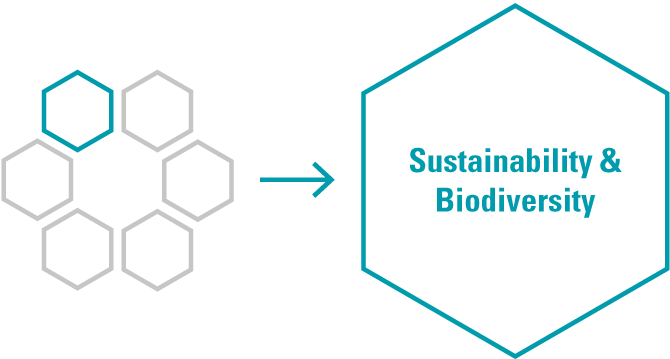

Profile Area Spokespersons
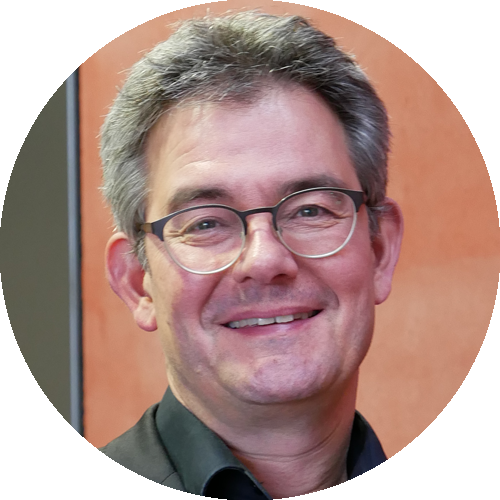
Spokesperson of the “Sustainability & Biodiversity" Profile Area
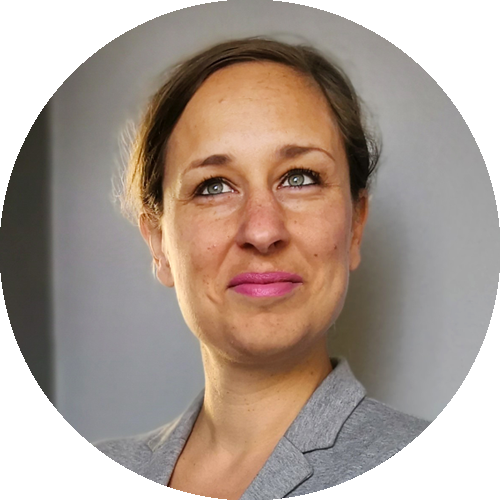
“For me, the 'Sustainability & Biodiversity' Profile Area is a unique place where the findings of different disciplines are brought together and combined to shape a more sustainable future."
Barbara Brandl (Sociology with a focus on Organization and Economics),
Spokesperson of the “Sustainability & Biodiversity" Profile Area
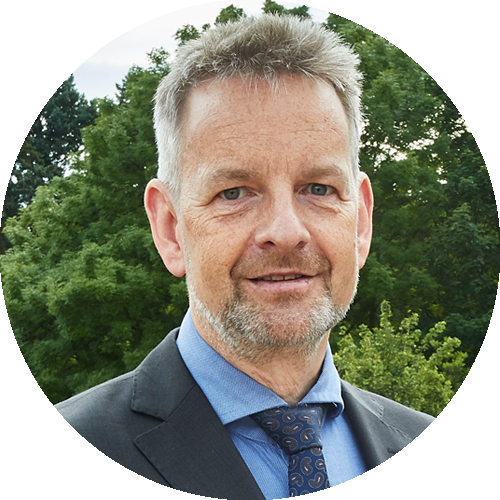
“The extent to which the threats to our natural basis of existence are currently progressing calls for new approaches, including an inter- and transdisciplinary integration of the broad spectrum of expertise at Goethe University and its partner institutions to develop sustainable and scientifically sound solutions. The 'Sustainability & Biodiversity' Profile Area offers excellent conditions for this."
Spokesperson of the “Sustainability & Biodiversity” Profile Area

Key Research Areas
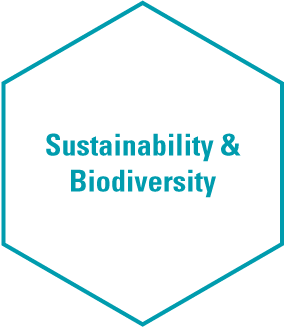
The research questions in the field of "Sustainability & Biodiversity" largely concern cross-cutting issues that require an interdisciplinary approach. That is why several departments, especially in the biological, molecular and life sciences (Faculties 14 and 15) as well as the geosciences (Faculty 11), are represented in this Profile Area and cooperate closely in research and teaching. Other subjects, such as economics and sociology, are also closely involved when it comes to questions on measures to avoid the dangerous consequences of climate change, for example. Extensive synergies are generated through interdisciplinary cooperation and by linking and bundling Goethe University's existing expertise in the individual fields, creating a profile with characteristic unique selling points.
Research on climate, weather and atmosphere
Biodiversity and Nature Conservation
This focus brings numerous topics that are currently in the public eye into a common ecological, economic, and social context. Topics include but are not limited to species conservation, biodiversity decline, chemical pollution, sustainability, renewable energies, physical and mental health, globalization, digitalization, genetic engineering, industrial and consumer society, the global trade and financial system, nutrition, demographic changes, and social inequality.
Read more
Particularly important to this Profile Area is the research initiative “RobustNature" (Robustness and Resilience of Nature-Society Systems in the Developing Anthropocene). The Faculty of Biological Sciences (15) has initiated an intensive interdisciplinary collaboration to investigate important questions on human-ecosystem dynamics in cooperation with the faculties of Law (1), Economics and Business Administration (2), Social Sciences (3), Geosciences and Geography (11), Medicine (16), as well as the Senckenberg – Leibnitz Institution for Biodiversity and Earth System Research (SGN), the Helmholtz-Centre for Environmental Research (UFZ), the Institute for Social-Ecological Research (ISOE), the Leibniz Institute for Financial Research (SAFE FhG-IME), RWTH Aachen University, and select international partners (University of Saskatchewan Canada, ETH Zurich and Stockholm University). Using a multiscale approach, RobustNature will develop a process understanding of the topic cluster of robustness and resilience from a disciplinary, interdisciplinary and transdisciplinary perspective. RobustNature addresses the decline of biodiversity, impacts of climate change, and chemical stress. The interactions and interdependencies of these three areas are considered major challenges for international research in the coming years in statements issued by Leopoldina as well as in reports of international panels like the Intergovernmental Panel on Climate Change (IPCC), the Intergovernmental Science-Policy Platform on Biodiversity and Ecosystem Services (IPBES) and the International Panel on Chemical Pollution's NORMAN Network of reference laboratories, research centers and related organizations for monitoring of emerging environmental substances (IPCP/NORMAN). Specifically, RobustNature intends to focus on the topics of water, organismic interactions and systemic risks, to develop knowledge-based transformation research of nature-society systems using the examples of biodiversity and water – all the way from knowledge to action.
Goethe University leads several coordinated research networks that have been comprehensively and excellently established. They include a Transregio Collaborative Research Center (DFG-TRR) on tropopause research, operated together with the University of Mainz; a Priority Program and six German Research Foundation (Deutsche Forschungsgemeinschaft, DFG) Research Groups, EU projects (including two Marie Skłodowska Curie Innovative Training Networks), as well as publicly funded LOEWE Centers and Priorities. Additional research collaborations are in the works, including, for example, an Integrated Research Training Group (IRTG) Water Health on integrated water research with the University of Saskatchewan, Canada. In addition to the coordinated research consortia, the Profile Area also brings together proven and excellent young researchers (visible, among other things, through Emmy Noether junior research groups, Heisenberg positions, DAAD-German Academic Exchange Service junior research groups). The established researchers include an ERC Advanced Grant holder as well as four researchers, who have been honored as Highly Cited Researchers in recent years. The Profile Area has innovative and modern research infrastructures in place, including the Taunus Observatory for atmospheric and earthquake research and the newly built science center FIERCE (Frankfurt Isotope & Element Research Center). All told, the Profile Area bundles several research activities in which the participating Goethe University researchers occupy leading international positions.
In addition to more traditional courses such as biology, geosciences or meteorology, the offer also includes interdisciplinary courses such as the MSc Environmental Sciences. The MSc Environmental Sciences and the MSc Ecology & Evolution are the main beneficiaries of the networking, joint research and knowledge generation activities in the "Sustainability & Biodiversity" Profile Area. Within RobustNature's framework of research-oriented teaching and networking, both programs will receive current knowledge, content-related impulses and unique research topics. The further development of the existing Master's program in Ecology & Evolution is also of great importance for the "Sustainability & Biodiversity" Profile Area; it is being carried out in the spirit of an interdisciplinary and internationally-oriented and focused Master's program "Biodiversity and Ecosystem Health".
The Profile Area is closely interlinked with and strategically embedded in the networks of several other Profile Areas; in some cases, research foci are also integrated into two separate Profile Areas. For example, the research foci Earth System Research and Biodiversity and Nature Conservation as well as the potential research field Organismic Interactions are closely integrated into the Structure and Dynamics of Life Profile Area, whereas the potential research field of Transdisciplinary Sustainability Research is synergistically closely linked to the Profile Area Global Orders and Societal Transformations. Additional touchpoints exist, including in the field of Space, Time and Matter, and especially for the research focus Condensed Matter and Quantum Materials.

Coordinated Research Projects
DFG (German Research Foundation)
- CRC/TRR 301 "TPChange - The Tropopause Region in a Changing Atmosphere"
- RTG 2566 "Imol - Interfacing image analysis and molecular life-sicence"
- RTG 2836 "Fixing Futures: Technologies of Anticipation in Contemporary Societies"
- FOR 2630 "Global CDA - Understanding the global freshwater system by combining geodetic and remote sensing information with modelling using a calibration/data assimilation approach"
- FOR 2774 "LawFin - Foundations of Law and Finance"
Associations
- EXC 2186 "FSC - The Fuel Science Center. Adaptive Conversion Systems for Renewable Energy and Carbon Sources" (RWTH Aachen)
- FOR 2730 "RESPECT - Environmental Changes in Biodiversity hotspot Ecosystems of South Ecuador: RESPonse and feedback effECTs (Marburg University; KIT)
- FOR 5064 "Kili-SES - The role of nature for human well-being in the Kilimanjaro Social-Ecological System” (Senckenberg)
- SPP 1294 "HALO - Atmospheric and Earth system research with the High Altitude and Long Research Aircraft" (University of Leipzig)
HMWK (Hessian Ministry of Higher Education, Research, Science and the Arts)
Association
- LOEWE-Center "TBG - Translational Biodiversity Genomics" (Senckenberg)
- "gWTriade - Integrated assessment of groundwater systems" (LURCH programme)
- "ACTRIS-D - The Aerosol, Clouds and Trace Gases Research Infrastructure" (at Taunus Observatory)
- "EffectroH2O - Effect-based Monitoring demonstrates Efficiency of Electrically-driven Water Treatment Processes to Remove Salts and Micropollutants from Process Water" (with RWTH Aachen, IIT Madras India, TWIC India)
- "FlutNetz - Improving access to medical emergency care during flood disasters in Bangladesh" (with RWTH Aachen and ISOE)
Association
- "DISTENDER - Developing Strategies by integrating mitigation, adaptation and participation to Climate Change Risks" (Universidad Politécnica de Madrid, ESP)
Others
- Hessian State Agency for Nature Conservation, Environment and Geology (HLNUG): "Auswirkungen des Klimawandels auf aquatische Ökosysteme und Wasserversorgung im Biosphärenreservat Rhön" („Impacts of climate change on aquatic ecosystems and water supply in the Rhön biosphere reserve" - German link only)
Distinguished individual Researchers
ERC Grant
- Advanced Grant "ACETOGENS - Acetogenic bacteria: from basic physiology via gene regulation to application in industrial biotechnology" (Volker Müller, FB 15)
- Synergy Grant “BATPROTECT - Learning from Bats: New Strategies to Extend Healthspan and Improve Disease Resistance" (Michael Hiller, FB 15; awarded via SGN) - press release
Emmy Noether Junior Research Groups
- "ALFA - Aerosol Loadings in the Future Atmosphere" (Alexander Vogel, FB 11)
- "Peptide biosynthesis off the beaten path: Machine learning-guided discovery of non-canonical peptide natural products" (Eric Helfrich, FB 15)
Heisenberg Programme
- Professorship "Applied Critical Geography with a Research Focus on Housing" (Sebastian Schipper, FB 11) - German link only
Institutions involved
GRADE-Centers
Institutions of Goethe University
- FCAM - Frankfurt Center for Advanced Light Microscopy
- FIERCE - Frankfurt Isotope and Element Research Center
- ZIAF - Center for Interdisciplinary African Studies
Cooperating Institutions
Institutes of Non-University Partners
- SGN - Senckenberg (Leibniz Institution for Biodiversity and Earth System Research)
- SBiK-F - Senckenberg Biodiversity and Climate Research Centre
- Fh IME - Fraunhofer Institute for Molecular Biology and Applied Ecology
- UFZ - Helmholtz Centre for Environmental Research
- IfLS - Institute for Rural Development Research
- FCC - Frankfurt Conservation Center
- bioF - BioFrankfurt - Network for Biodiversity
- LSI - Lore Steubing Institute (Hessian Agency for Nature Conservation, Environment and Geology)
- TERENO - TERrestrial ENvironmental Observatories (Helmholtz)
- Studying at Goethe University
- International applicants
- Faculties
- Overview of study programmes
- Programme for refugees
- GRADE
- Goethe Business School (continuing education)
- Research at Goethe University
- Scientific news
- Goethe Welcome Center (for international researchers)
- Collaborative research projects
- Individual research
- Visiting fellowships
- Endowed chairs
- About the University
- News-in-brief
- University administration
- Campus locations
- Campus life
- University archives (German)
- Rhine-Main-Universities











